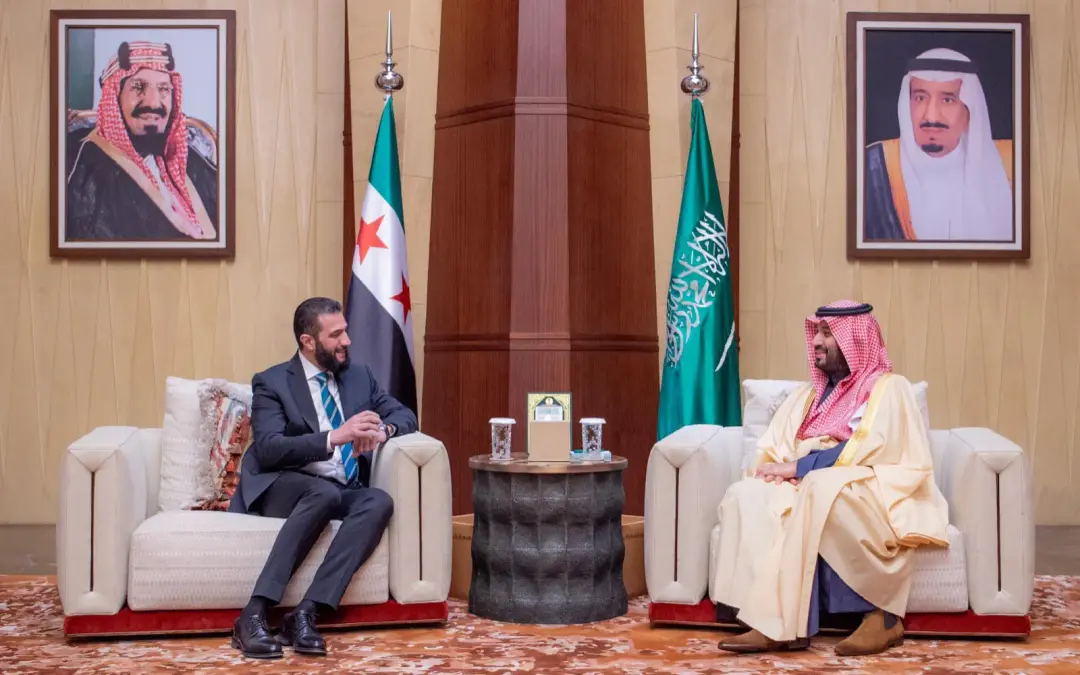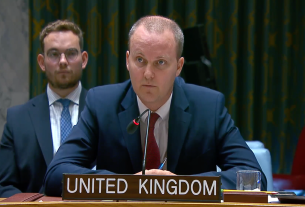Syria’s interim president, Ahmed al-Sharaa, made his first official international visit to Saudi Arabia on Sunday, marking a significant shift in the country’s diplomatic approach following the toppling of Bashar al-Assad. Al-Sharaa’s visit to Riyadh signals Damascus’ effort to realign itself regionally, potentially distancing from its long-time ally Iran, and strengthening ties with Gulf states such as Saudi Arabia.
Al-Sharaa’s Diplomatic Push
Al-Sharaa, appointed interim president after Assad’s ouster in December, was welcomed by Saudi Crown Prince Mohammed bin Salman in Riyadh. The visit, shown live on television, featured the two leaders shaking hands and sitting down for talks. This marks al-Sharaa’s second major diplomatic meeting since assuming office. Just days earlier, Qatar’s Emir Sheikh Tamim bin Hamad Al-Thani became the first foreign leader to visit Damascus since the removal of Assad, underlining the shifting dynamics in the Middle East.
Accompanied by Syria’s Foreign Minister Asaad Hassan al-Shibani, al-Sharaa’s visit is seen as a step towards engaging with key regional powers as part of Syria’s reconstruction and stabilization efforts. His government has been actively seeking support from both Arab and Western countries.
Saudi Arabia’s Role in Syria’s Future
The timing of al-Sharaa’s visit is significant, as Syria looks to secure financial backing for its war-ravaged economy. Saudi Arabia, with its vast resources, has been positioning itself as a key player in Syria’s recovery. During an interview in December, al-Sharaa expressed confidence that Saudi Arabia would play a central role in Syria’s future, emphasizing the country’s potential for investment and development. He also noted his personal ties to Saudi Arabia, having spent his early years there.
Saudi Arabia’s involvement is seen as critical not only for economic recovery but also for geopolitical stability in the region. Riyadh’s efforts to reintegrate Syria into the Arab fold follow years of tension and align it against the influence of Iran, which has been a staunch ally of the Assad regime.
Shifting Alliances and Regional Implications
The Syrian civil war has long been a battleground for regional influence, with Saudi Arabia and Iran backing opposing sides. While the two countries recently ended a diplomatic freeze, they remain at odds over several issues, including the fate of Syria. Saudi Arabia’s alignment with al-Sharaa represents a strategic shift that excludes Iran from Syria’s political landscape, weakening Tehran’s regional influence.
Experts suggest that Riyadh’s engagement with Syria also serves broader security and economic interests. Regional expert Rabha Seif Allam noted that the stabilization of Syria would benefit Saudi Arabia by reducing drug trafficking from Syria, which had destabilized Gulf states.
Calls for Sanctions Relief
Al-Sharaa’s government has also focused on efforts to lift international sanctions imposed on Syria, which date back to 1979 and were intensified following the crackdown on anti-government protests in 2011. Saudi Arabia’s foreign minister, Prince Faisal bin Farhan, visited Damascus in January, signaling Saudi support for Syria’s sanctions relief. Riyadh has been engaging with Western powers, including the United States and the European Union, to push for the lifting of restrictions, which have hindered Syria’s economic recovery.
Conclusion
Al-Sharaa’s diplomatic visit to Saudi Arabia underscores Syria’s shifting alliances and the country’s attempts to recalibrate its position in the Middle East. With crucial support from Gulf nations, particularly Saudi Arabia, Syria aims to secure the resources necessary for its reconstruction and long-term stability. As the regional balance continues to evolve, Syria’s reintegration into the Arab world could shape the future of Middle Eastern geopolitics.
(EPA Images pic) Via FMT CC BY 4.0



